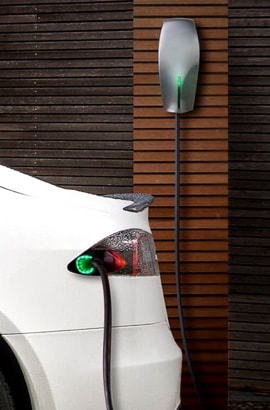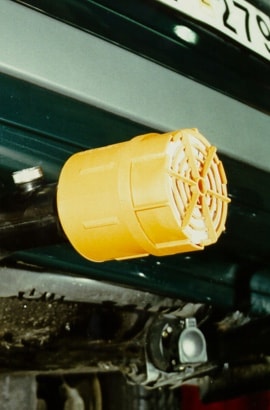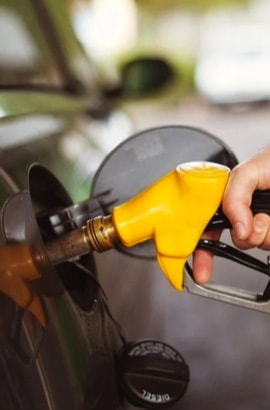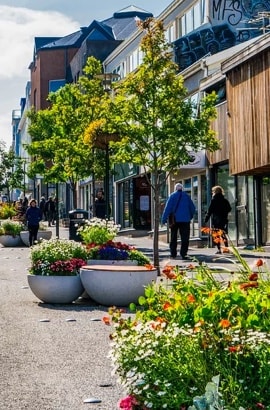uST
Innovative transport that our planet needs
Modern transport is destroying the planet.
The climate is changing.
Today the transport industry accounts for up to 70%1 of the total amount of harmful emissions into the atmosphere, which lead to water and air pollution. If greenhouse gases heat the atmosphere by 1.5 C2 every year, then in 12-year time, we will face a climate crisis: inundation of coastlines, large-scale droughts and forest fires.
up to 30%
greenhouse gases in the US and Europe are 3 produced by cars
4600 kg
carbon dioxide is emitted by one car per year
4
Nature is disappearing.
The construction of roads changes the riverbeds, runs through forests that produce oxygen and destroys millions of hectares of fertile land under the asphalt, which can be used for food cultivation.
200 thousand km
2
of the land is under the asphalt
5
Animals die.
Roads are a major source of mortality for populations of deer, foxes, turtles and many other wild animals. Millions of animals die under the wheels of cars every year, and when the road crosses an animal's habitat, the chances of road death increase by many times.
1 ml
animals die every day in such countries as the United States
6
on 60%
there will have been more roads in the world by 2050
7
by 2.5 times
the number of wild animals has decreased in the last 50 years
8
The whole world is looking for a solution.
Electric motors are being developed

Exhaust filters are being introduced

The fuel quality standards are being set

The greenery spaces
are being created

The best solution is offered by Unitsky String Technologies Inc.
The above-ground electric vehicle
on high-strength string rails.
The project has become a member of the United Nations environmental programme.
up to 100 years
the track structure may not need to be overhauled.
fundamentally new transport models have been developed at UST Inc.
3 types of sensors provide autopilot operation according uST technology
Runs on clean energy.
The engine of the string transport uses electricity and does not create harmful emissions into the atmosphere. It is 3 times more efficient than an internal combustion engine and is charged with environmentally friendly energy: wind, sun, geothermal energy.
up to 15 times
less electricity is consumed by the string transport than by the car
Saves nature on the Earth.
uST transport takes up minimal space on the ground. It takes less than 100 m2 of land, that is, the area of the forest path, to build one kilometer of string track. That's 140 times less than the area of a four-lane highway.
The construction of the string tracks will not change the natural landscape and will preserve forests that produce oxygen. Millions of hectares of fertile land under the string tracks can be used for agriculture.
100 m2
one kilometre of the string track on the ground takes up
Keeps the animal world safe.
The string tracks are from 4 to 15 metres above the ground. This eliminates any collisions of vehicles with animals and reduces their mortality rate by several times. The area around the string tracks remains untouched: there are preserved reservoirs and animal habitats.
up to 15 m
above the ground, there could be the string track
How does uST transport work?
Rail
To give strength, the steel rail is additionally reinforced with stressed strings - bundles of stretched steel cables. The smoothness of traffic movement on such a rail is up to 120 times higher than that of car tires on the road. This reduces fuel costs and allows vehicles to move faster and safer.
Electric engine
The uST engine can run on any clean fuel from natural gas to methane and hydrogen. Transport can use an autonomous source of energy - on-board batteries, capacitor or molecular energy storage devices, fuel batteries, etc.
Body shell
The uST high-speed module has aerodynamic drag coefficient of only 0.075. This is 5 times less than of the fastest production cars. Less air resistance allows to reduce fuel consumption tenfold and safely accelerate up to 500 km/h.
The flyover
The rails for uST transport are placed between the supports, forming a flyover. Due to the uncut structure of the string rail, the uST flyover is 5 times flatter and 3 times stronger than traditional bridges and flyovers for cars or trains. Located above ground, the flyover can be built in any terrain, from mountain ranges to deserts and jungles.
Receive the presentation of the uST technology with a description of all elements of the system
Where is uST transport represented?
EcoTechnoPark is a Testing Center for uST technology on an area of 36 hectares in Belarus.
-
5
track types have been built
-
8
type of transport have been tested
-
6000
visitors have become passengers
Look at the EcoTechnoPark in the virtual reality
The uSky Testing and Certification Center in the Emirate of Sharjah.
In October 2019, the first test section of uSky's Test and Certification Center opened in the Emirate of Sharjah. The Center has a total area of 28 hectares, on its territory string technologies will be tested in the Middle East.
The uST track project in Dubai.
In April 2019, the Emir of Dubai approved a package of projects proposed by the country's Ministry of Transport. The projects included an urban transport system using uST technology with a total length of 15 km with 21 stations along the route.
Follow the achievements of the innovative string transport project by email
String transport is developing thanks to crowdfunding.
Crowdfunding allows anyone to invest in uST transport technology and get a portion in an international environmental project. There are teachers, businessmen and students among the hundreds of thousands of investors.
2014 is the year when crowdfunding was started
$50 minimum investment amount
200 countries of the world
Get instructions on how to invest in an innovative string transport project
An investment in uST technology:
-
1
Entitles person to dividends from all successfully implemented string transport projects.
-
2
Can save tens of millions of animals from death on the roads.
-
3
Can preserve hundreds of square kilometres of forests, fields and reservoirs around the world intact.
Funding for uST technology is nearing completion.
In 2014, the management of UST Inc. developed a 15-stage project development plan: from startup to self-sustainability and profitability. Today, you can invest in string transport technology and become a co-owner of the entire technology. This means that you will be able to receive dividends from each successfully implemented commercial project using uST technology.
Stage 14
Today is the 15.1 stage of financing.
After Stage 15, it will only be possible to invest in individual targeted projects.
The string transport project is a secure future for the planet.
Investing in uST technology is an opportunity to bring it closer.
Invest







